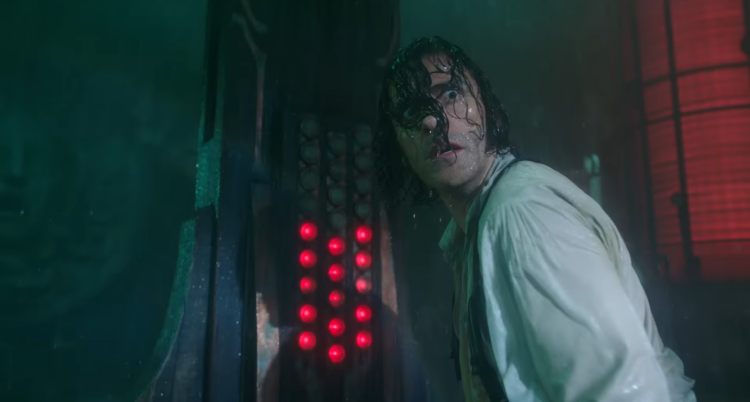
In the rather niche academic field of monster studies, the common understanding of monstrosity is very similar to that of queerness: through being “different,” a monster destabilizes historical notions of normality and normativity, exposing how fictitious they were in the first place. In the case of Victor Frankenstein and his creation, per Mary Shelley’s eponymous novel, this defining relationship cannot be any more obvious. Maker and creature form an inseparable whole, laying bare an interdependency in the way we describe humanity: always against its “other.” When such motifs dominate Guillermo del Toro’s filmography, from Cronos to Golden Lion and Best Picture winner The Shape of Water, his highly anticipated adaptation of Frankenstein comes as no surprise. A delightfully pestilent Oscar Isaac plays the mad scientist Victor Frankenstein in almost unrecognizable shape at the beginning of the film, his overgrown beard and hair hanging upon his face in icicles at the North Pole.
There, a Danish captain (Lars Mikkelsen) of a Royal ship vows to protect the rugged stranger with a prosthetic leg after rescuing him from the grasp of a vicious, large creature: the monster (Jacob Elordi) resembling a human cloaked in furs, but whose boney fingers and ability to survive all the bullets fired at him suggest anything but. A modest battle scene unfolds with the Danish losing six men to the monster, but it’s Victor it wants. So begins the story (or should we say a story) of Dr. Victor Frankenstein that serves as the film’s first chapter, told in an hour-long retrospective episode.
A lot of time is spent on Victor’s upbringing––his stern, sadistic surgeon father, his bubbly mother who died giving birth to a second child, and the irreconcilable loss propelling him to “expand the narrow limits of academia” and mess with life and death through science. At first a laughing matter to the medical academy, Frankenstein soon wins over a wealthy man called Harlander (Christoph Waltz) to be his patron: he is not only the future father-in-law to Victor’s younger brother, but more importantly, he owes his fortune to arms manufacturing. An important detour for Del Toro’s script here is the timeline of events––while Mary Shelley’s novel is set in the 1700s, the film’s present day is 1857. Coincidentally or not, that year marks the start of the Reform War in Mexico, even though the film’s plot remains entirely Eurocentric. Regardless, Harlander’s promise of unlimited funds, a castle-lab, and as many rods of pure silver one can wish for comes with strings attached––military profit funding innovations, tale as old as time.
Victor narrating his story easily allows it to slide into familiar tropes, be it the misunderstood genius, the Oedipal son who dreams of replacing his father in every way possible, or the jealous lover suffering from the sting of rejection. The latter is courtesy of his brother’s fiancée Elizabeth (Mia Goth), whose enigmatic presence and vocal stances bewitch the already frenzied Victor. In turn, his moral failings as both a man and scientist bring Elizabeth’s character into sharp focus, allowing for Goth to explore the subterranean tensions of a role with very little screaming involved. Needless to say, she charms, stuns, and captivates as easily as the lavish blues and greens of her romantic gowns––velvet, hand-drawn silk, and tulle abound thanks to the excellent work of costume designer Kate Hawley. We expect nothing less than the extraordinary when it comes to Del Toro’s intricate film worlds, so a bow to Tamara Deverell’s production design is imperative.
In the film’s second (and somewhat surprising) chapter, “The Creature’s Story,” Frankenstein’s monster reclaims the narrative, picking up from where his master left off––a viable structure with emancipatory potential, no doubt. But the mix of grieving sadness and wholesome realizations offered by the last act doesn’t feel entirely earned. Perhaps the rhythm is to blame as much as the time jumps, and the fact that those two sides of the story don’t get the same amount of screen time. Yes, the film is called Frankenstein, but it feels like he never fully deserved the title of protagonist, especially since Oscar Isaac manages to give such a strong performance playing a morally limp man who flew too close to the sun.
There are a few allegorical interpretations one can impose on Victor and the creature, always phrased as a dichotomy––nature-culture, past-present, parent-child––but what stands out is the literal power of storytelling and who gets to do it. Frankenstein’s monster has to learn to walk, feel, and talk in a way different from humans––perhaps a freer, “purer” way, as Elizabeth would suggest. Religious undertones notwithstanding, the notion of forgiveness is crucial in Del Toro’s film and perhaps makes it the most optimistic of this year’s Golden Lion contenders.
Frankenstein premiered at the Venice Film Festival and opens in theaters on October 17 and on Netflix on November 7.
The post Venice Review: With Frankenstein, Guillermo del Toro Crafts an Intricate World and Rhythmically Off-Kilter Adaptation first appeared on The Film Stage.
from The Film Stage https://ift.tt/78dkg5r


0 Comments